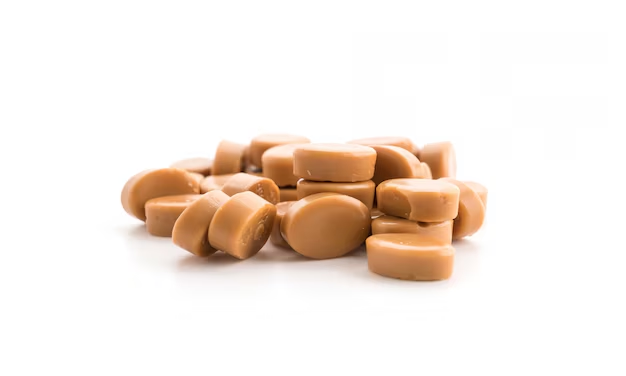Caramel is a beloved confectionary flavor found in desserts, snacks, and beverages. Its rich, sweet taste has made it a staple in coffeehouses and candy aisles worldwide. However, a common question arises: Does caramel contain caffeine? To answer this, we’ll explore what caramel is, its natural composition, and whether caffeine can be present in it.
What Is Caramel?
Definition and Composition
Caramel is a confectionery product made by heating sugar. The process involves melting sugar until it reaches a golden-brown color and releases a rich, sweet aroma. Basic caramel recipes include sugar, water, and sometimes milk, cream, or butter to enhance flavor and texture. The result is a versatile ingredient used in sauces, candies, and desserts.
Traditional Caramel vs. Caramel Flavoring
Traditional caramel is homemade or crafted in small batches using natural ingredients. In contrast, commercially produced caramel flavoring is often a synthetic product designed to mimic the taste of real caramel. These flavorings may include additional ingredients like preservatives, artificial colors, and sometimes caffeine, depending on the product.
Does Caramel Naturally Contain Caffeine?
Natural Composition
Traditional caramel, made from sugar and water, does not naturally contain caffeine. Caffeine is not a byproduct of heating sugar or the caramelization process. Therefore, homemade caramel is inherently caffeine-free.
Common Additives
However, some caramel-flavored products may include additives or flavorings that introduce caffeine. For example, caramel syrups used in beverages might be formulated with caffeine to enhance their appeal in coffee-based drinks or energy products. It’s essential to check the product label to confirm whether caffeine is present.
Caramel in Coffee and Energy Products
Caramel-Flavored Coffees
Caramel is a popular flavoring in coffee beverages. While it itself doesn’t contain caffeine, the coffee it’s mixed with does. For instance, a caramel macchiato or latte will have caffeine because of the espresso or brewed coffee used as the base.
In these beverages, caramel simply adds sweetness and flavor. The caffeine content comes from the coffee.
Energy Drinks and Snacks
Caramel is also found in energy drinks and snacks, often as a flavor enhancer. Many of these products are marketed as providing an energy boost, which usually comes from added caffeine. While its favor itself remains caffeine-free, these items often include caffeine as a deliberate ingredient.
Reading Labels: Identifying Caffeine Content
Understanding Ingredient Lists
When choosing caramel-flavored products, always read the ingredient list. Look for keywords like “caffeine,” “coffee extract,” or “guarana,” which indicate the presence of caffeine. If the product includes these terms, it likely contains caffeine.
Regulations on Caffeine Labeling in the U.S.
In the U.S., the Food and Drug Administration (FDA) requires manufacturers to disclose caffeine on the label if it is added to a product. This helps consumers make informed choices, especially if they are sensitive to caffeine. However, caffeine content might not always be listed in milligrams, so it’s important to be cautious with products marketed as energy boosters.
Health Considerations
While caffeine is safe for most people in moderate amounts, individuals sensitive to caffeine or with specific health conditions should be cautious. Caramel-flavored products can vary in their caffeine content, depending on their formulation.

Caffeine Sensitivity
Caffeine-sensitive individuals may experience symptoms like jitteriness, headaches, or sleep disturbances even at low doses. For these individuals, it’s essential to avoid products with hidden caffeine.
Daily Caffeine Intake Recommendations
The recommended daily caffeine intake varies by age and health status:
- Adults: The FDA suggests up to 400 mg of caffeine per day, roughly equivalent to 4-5 cups of coffee.
- Children: The American Academy of Pediatrics advises against caffeine consumption in children under 12. For teens, caffeine intake should be limited to less than 100 mg per day.
Related to Read: A Slice of Heaven: The Perfect Caramel Pecan Pie Recipe
Popular Caramel Products and Their Caffeine Content
Caramel is used in a range of products, from candies to beverages. While traditional one is caffeine-free, some caramel-flavored items may include caffeine as an additive. Let’s examine popular caramel product.
Caramel Candies
Most caramel candies, like soft caramels are caffeine-free. Popular brands focus on natural caramel flavors without introducing stimulants. Examples include:
- Werther’s Original Caramels: Caffeine-free.
- Kraft Caramel Squares: Caffeine-free.
These candies are safe for caffeine-sensitive individuals and children.
Caramel-Flavored Beverages
Caramel-flavored drinks are often made with coffee or tea bases, which naturally contain caffeine. For instance:
- Caramel Macchiato (Starbucks): Contains 150 mg of caffeine in a 16-ounce serving due to the espresso base.
- Caramel Frappuccino (Starbucks): Includes approximately 95 mg of caffeine in the same size.
FAQs
1. Does caramel itself contain caffeine?
No, caramel itself does not contain caffeine. It is made by heating sugar and does not naturally include caffeine as an ingredient.
2. Why do some caramel-flavored products have caffeine?
Some caramel-flavored products, like coffee beverages or energy drinks, include caffeine as an additive. The caffeine usually comes from the coffee or is intentionally added to boost energy.
3. Can caffeine-sensitive individuals consume caramel?
Yes, caffeine-sensitive individuals can consume traditional caramel made from sugar, water, and butter. However, they should check labels on caramel-flavored products to ensure no caffeine has been added.
4. Are caramel-flavored syrups caffeine-free?
Most of these syrups are caffeine-free unless they are specifically designed for coffee or energy drinks, where caffeine may be an added ingredient. Always read the label to confirm.
5. How can I tell if a caramel product contains caffeine?
Check the product’s ingredient list for terms like “caffeine” or “coffee extract.” In the U.S., the FDA requires caffeine to be listed if it is an added ingredient.
Conclusion
Traditional caramel is caffeine-free, making it a safe option for most people. However, caramel-flavored products like coffee drinks or energy snacks may contain caffeine due to their formulation. Always read ingredient lists carefully, especially if you are caffeine-sensitive or monitoring your intake. By being aware of labeling practices and health considerations, you can enjoy caramel products while making informed choices.

